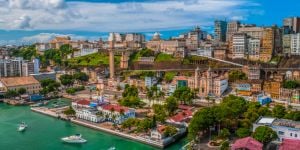Buying property in Brazil
Can foreigners buy real estate (or any other assets) in Brazil YES
The simple answer is yes. There is absolutely no restriction on purchasing property in Brazil, whether the purchaser is a Brazilian or foreigner. Likewise the purchaser does not even need to live in Brazil. Obviously there are some requirements that must be met with regard to documents necessary.
Essentially all you really need is your CPF (Cadastro de Pessoas Fisicas) and to obtain this you will need the following documents:
A valid passport OR your RNE (Registro Nacional Estrangeiro)
Birth Certificate (long form bearing names of both parents) which must be legalized by the Brazilian Consulate in the country of issue accompanied by an official translation thereof.
There are a number of taxes and fees that will apply to the purchase of real property and several documents that you will require so please take note.
ITBI (Impostos sobre transmissão de bens imobiliários) these on average will be about 2.5% of the sale price of the property.
Deed fees (taxa de escritura) R$400 R$3,400 for property with a value between R$10,000 R$175,000
Land Registry Office fees these are charged by the Registry (Cartório de Registro de Imóveis) and they are exactly the same amounts/property values as charged for the deed fees.
Laudêmio da Marinho a federal tax imposed on beach properties within 80m of the shoreline on average 5% of the value of the property.
Laudêmio Municipal is a municipal tax that may in some cases be applied in certain areas and on average is about 2.5% of the value of the property.
Then too are the taxes and fees that relate to the transfer of funds from abroad in order to make the purchase and an additional charge for the bank draft (cheque administrative) to pay the original owner (you should use this form of payment in order to protect yourself and prove payment).
Documents that your property should have:
At the time of purchase you will want the seller to provide a Certidão Negativo from the Registry which guarantees there are no liens or other attachments.
If building your own structure ALVARA which is a building permit issued by the city/municipality.
It is imperative that your property (whether you buy an existing home or build) possess a Certidão de Habit-se pronounced HABITZ. This document certifies that the construction is registered with the city/municipality and is in a regular situation. This is of real importance when selling or re-selling since bank financing cannot be arranged without it. You would be unlikely to find a buyer who is willing or able to pay on a cash only basis for property in Brazil. Do not assume that since the property is registered with the city and subject to IPTU (property taxes) that this is an indication that the property is regular.
While any good realtor (Corretor de Imóveis) is well aware of the process and all the documents, fees, taxes, etc., you may still want to arrange for a lawyer who deals with property transactions to look everything over to make sure everything is in order.

How much usually are down payments/deposits for houses in Brazil (Sao Paulo in particular)?
The downpayment is not really the problem, it is getting financing. This is almost impossible for expats since you can't even open a bank account here in Brazil unless you're a permanent resident with an RNE and CPF; or here on a VITEM-V Work visa and also have a RNE and CPF.
However, the usual downpayment for Brazilians varies and can be as much as 10 - 20 percent of the purchase price (unless there is some promotional down payment price), since they qualify quite often for the Minha Casa Minha Vida Program which provides funds for down payments.
Most expats tend to purchase property in a single payment agreement.
Cheers,
James Expat-blog Experts Team
Awesome thanks james. My fiance is a native brazilian..and we're looking to settle in sao paulo. Could you explain more about minha casa minha vida progam?
I really don't know that much about the Minha Casa Minha Vida Program, but it's essentially a grant for low income families, who have never owned any kind of real property previously. I believe that those families with a total family income of up to R$1600 per month qualify through the Caixa Econômica Federal which is the bank that administers the program.
There are restrictions, such as you cannot sell the property for a period (I believe 10 years) or you must repay the grant amount, you cannot rent out the property during that period as well. There are plans with up to 30 years to pay off the property.
For more information or to apply online visit the Caixa Econômica Federal website:
http://www.caixa.gov.br/voce/habitacao/ … m-pode-ter
Cheers,
James
My husband and I are looking to buy an apartment. We're not in a terrible hurry (we could even wait until next year to buy) but we've begun looking around for good deals in our neighborhood. We are both permanent residents of Brazil. (yay! finally!)
If we pay in cash or put down at least 50-75% in cash, does this give us room to negotiate the price down? Even though the Brazilian economy is sluggish, real estate prices in our neighborhood (Cambui in Campinas, SP) don't seem to have dropped much.  However, since I don't think that apartments here are currently selling like hotcakes, maybe we would have the upper hand if it came down to negotiating? Hmm...
However, since I don't think that apartments here are currently selling like hotcakes, maybe we would have the upper hand if it came down to negotiating? Hmm...
In the US, there are websites where one can look up a property and see its sale/purhcase history including dates (when and to whom was it last sold, when was it last listed, was it listed and then taken off the market, how long has it been on the market for), prices (last selling price, last listing price), property taxes, square footage, etc. Are there similar websites or databases here in Brazil? I know from experience that the more I know about a property/seller, the better. Also, is there a website where I can see new properties that have just hit the market? Back in CA, my sister recently bought a third property by diligently scouring such websites and then pouncing on a hot property before other offers came pouring in.
Are there any programs or incentives for first-time home buyers? We wouldn't qualify for a low-income family, but are there any other programs to help get families into their first homes?
Typically, what is the real estate agent's take? Does the seller pay the agent's commission? The buyer? Both the seller and the buyer?
Even though my husband has lived here for 30 years, he doesn't seem all that informed or up-to-speed on how to buy a house in Brazil. Any advice would be much appreciated!
Thank you,
Victoria
Hi Victoria,
With the US greenback still above R$3 I wouldn't waste too much time before getting around to buying your new home. That alone is going to save you a great deal on the transaction.
You certainly can always negotiate a decent discount over the asking price of a house or apartment when you are paying cash. Traditionally when you buy anything in Brazil you will have no trouble getting at least a 10% discount for paying cash, so anyone selling a property isn't going to be shocked when you ask for a discount.
I don't know how much difficulty you are going to have if you're looking for financing, but I'm sure you won't get any discount on the price for anything but a cash deal.
Regarding the realtor's commission, generally speaking it is the seller's responsibility to pay the commission unless you come to some other agreement. Realtors here really do not like to split commission, so if you retain your own realtor to help you look for property and the seller's agent isn't willing to split commission, then you will likely have to pay your realtor something. I'm not sure what the current rate of commission is, back when I sold a house here it was 6% of the selling price.
As far as I know there are no websites here in Brazil where you can do an online search of the property's history. About the only thing you can do is go to the municipality and inquire about its tax situation, assessed value. You can try getting information from the Cartório de Registro de Imóveis, but they may not be willing to share much of that with you.
The only sites here in Brazil are really just tools for finding properties to buy, sell or rent. They are searchable by state, city, type of property, buy/sell/rent/, number of bedrooms, price range, etc. Most of the listings show photos of the property so you're able to get a fairly good feel for whether you want to actually go see it or not. Check out the following sites.
www.lugarcerto.com.brwww.bomnegocio.comwww.olx.com.br
Cheers,
James Expat-blog Experts Team
There is no real financing in Brasil for old property (not sold on plan). Well it exists but rates are so high that nobody use property credit. When new properties are sold on plano, the building company propose some in house credit; this type of solution: client pay 10% in front, then 40% during over the next 3-5 years (corresponding to when property should be made available to the clients) then when property gets available, the client has to pay the remaining 50% to get the property. It means that actually Brazilians pay property in 4-5 years maximum. How it is possible? Well I don't know but firstly Brazil is one of the less equalitarian country in the world. People pay cash flats,cars, etc... How they can do that in a country where income is much lower than in US and Europe? I believe this cash is from informal economy, 25% in Brazil,much more where I live in nordeste.
Bardamu wrote:There is no real financing in Brasil for old property (not sold on plan). Well it exists but rates are so high that nobody use property credit. When new properties are sold on plano, the building company propose some in house credit; this type of solution: client pay 10% in front, then 40% during over the next 3-5 years (corresponding to when property should be made available to the clients) then when property gets available, the client has to pay the remaining 50% to get the property. It means that actually Brazilians pay property in 4-5 years maximum. How it is possible? Well I don't know but firstly Brazil is one of the less equalitarian country in the world. People pay cash flats,cars, etc... How they can do that in a country where income is much lower than in US and Europe? I believe this cash is from informal economy, 25% in Brazil,much more where I live in nordeste.
Hi Bardamu! I apologize but I just saw your post. My husband and I are looking to buy a pre-owned property rather than a property sold "on plano," which I think is a planned property that hasn't been built yet, am I right? For the past month, we have been working with a local realtor (corretora) and have looked at about 10 properties total including houses and apartments but we haven't found the right place yet. Here in Campinas, the real estate market has cooled (I read that home sales are down 11% from the same time last year) and even in the last month, we've seen sellers lowering their asking prices. I think now is a good time to shop around because owners should be more willing to negotiate, especially if they're desperate to sell. I also agree with you - I don't know how most Brazilians could afford to buy a place without financing of some kind. Everything is so incredibly expensive in this country yet in general, the earning power of even middle class Brazilians is nowhere near the earning power of middle class Americans or Europeans.
It's not all that difficult for Brazilians to obtain financing, they have the ability to withdraw money from their FGTS plan with the government, are benefited with government programs like Minha Casa Minha Vida which provides money to put down against a property that will be their sole residence and they can also obtain bank financing through the Caixa Econômica Federal.
However, it is virtually impossible for expats (even permanent residents) to obtain financing unless they are married to a Brazilian. Most expats here tend to buy their homes in a single payment transaction unless they're lucky enough to find a private sale where the seller is willing to finance the sale himself.
Cheers,
James
Well, minha casa type of project are on the cheapest side of properties. I meant a familly flat (100m2>) in a nice bairro is minimum R$1M in all major cities. Paying that in 4-5 years is quite unheard in Europe/US if de keep in mind AVG salary in Brasil. FGTS is certainly not enough.
Certainly there are some good deals at the moment because prices did not increase in 2 years (despite inflation),stocks are huge. Just be carrefull to buy from a reputable construction company. Be carrefull loans provided by construction companies are reevaluated with inflation. Still, they are better that banks property loans.
hi
i am Pakistani in Brazil on business visa. my wife and my daughter are British citizen in Brazil with me. any one have knowledge about how can i get Brazil resident visa with family in Brazil?
Hello shahnsr,
Well, the only way you're going to obtain Permanência Definitiva in Brazil (since you're all non-Brazilians) is either to work in Brazil on a VITEM-IV Work Visa for a minimum of 3 years and apply to transform that into Permanent after the three years are completed. (Note: VITEM-V visas are issued for a period of 2 years, so it will require at least one renewal before transformation)
or
If you are willing to invest R$150 thousand (about USD $50 thousand) in a Brazilian company or starting a company here. This requires a written business plan outlining the kind of business, general area where you plan to operate, estimated annual revenues, number of Brazilians (if any) you will employ. The VIPER Permanent Visa based on Investment is issued for a PROVISIONAL 3 year period. Once renewed it becomes permanent. The only requirements upon renewal are that the initial investment HAS NOT been repatriated, and that the business is still in operation.
Starting up a business in Brazil is a very bureaucratic and lengthy process, it will require the assistance of an accountant and/or a lawyer that is experienced in business start-ups.
Cheers,
James Expat-blog Experts Team
James, so you are saying it is not possible for foreigns to finance a new property or house? Regardless with a temporary or permanent residence permit? Then all foreigns can do is rent a property or house?
You can finance with a Permanent Visa with some banks, however it is still extremely difficult to obtain financing. Most expats purchase homes in a single payment transaction for this reason.
Banks here will not finance for temporary residents at all. In fact you have a nearly impossible job to even open a bank account unless you're a permanent resident.
Cheers,
James Expat-blog Experts Team
James,
Thank you.
I guess it is all about the person you deal with at these companies such as banks.
Before i was officially employed here in brazil (i already obtained workpermit and visa), one week after i arrived in brazil, i went to bradesco with my written work
contract and without carteira do trabalho (number) and they accepted me to open an account with temporary residence permit. All they where looking for is my income. Even more they enrolled me in the visa gold program. I just wonder if i could make a financing for a property or house, would that be more in favor of me when renewing (extend) the residence permit? I am just asking your opinion. Also i was reading that after the 1st renewal of a vitem v visa your visa is automatically changed to permanent visa?
Unless you have Permanent Resident status I doubt any bank is going to finance high end items like property or automobiles. I've never heard of it before.
Banking regulations have tightened up considerably since 2015: banks won't open an account anymore for a foreigner who doesn't have a CRNM.
1. Most real estate portals deal with asking pricing. There is no such a thing as an MLS database in Brazil. Rule of thumb, an outright cash purchase should yeld a 5-10% discount of a fair market rate, and that depends entirely on the seller's motivation.
2.Traditional databases are Imovelweb, Viva Real, and Zap Imoveis. Then there are brokerage websites.
3.History background on a property.... no such thing. You will get around this at the pre closing process where all the relevant paperwork is generated. By then you will know on liens, pre conditions, and a peek at a matricula will tell you how often that property was sold over.
4. Avoid pre construction deals. Unless you know the builder. My advice is to acquire an older building or apartment within it. IF you do your due diligence on the condo association, you will avoid costly mistakes. Use a Licensed Real Estate Broker for such.
These days, with mostly pre fab structures, the quality workmanship is not as good as anything done before the 70's. Besides the emphasis on amenities and less on overall building quality means you will be paying for an asset that will eat up more maintenance money over time.
Most of people working on the construction trade nowadays don't amount to squat.
Get a beat down old building, if a single tenancy home, or a decent apartment at an older but well maintained building. You can always enroll kids on some extra curricular activity.
I just saw the post from James.
To those who did not know James on a personal basis, I can assure you, that you missed an exceptional person. I still miss James every day of my life. He was truly a special person with inteligence and humility and the desire to help.
RIP my dear friend!!!
I am looking at purchasing a Farm near my home. My first question is my Brazilian wife will be getting a bank loan. I read the banks loan up to 80% of the value of the property. I am trying to find out how the bank will value the property. I know a farm close to the one we are looking at sold for 160,000 Reals about 8 months ago. The one we are looking at has two home on it and is in much better shape. It’s has more land. Any suggestions or website that could give us a ideas of value. Thanks
Unless you are desperate with no means, the last place you want to invest is in anything sponsored by such social programs, such as Minha Casa Minha Vida, or whatever name they coined as of lately.
Land sites for such programs tend to be in areas removed from central areas, entailing longer commutes. This is so because land needs to be dirt cheap. Unless there is a community land grand in downtown.
The workmanship, engineering, and materials employed in these projects are the lowest grade ever possible. If you've seen any US Public Housing, as aesthetically unpleasant they might be, at the very least they were built sturdly to last. I am talking about Lyndon Johnson's HUD Projects.
Brazilian projects, on the other hand, are no free giveaways to the pauper, they are to be paid for by dwellers, and even then they are not built to last. Walls that seep, crack, floor plan footage meant to accomodate the equivalent of an efficiency apartment in the US suddenly turns out to be a two bedroom apartment. Crooked door frames, uneven stucco walls.
You have a parking spot, you want it covered, you will have to order parking shade at your own expense.
The elevators are to be a luxury in Brazil, they add to the overall cost of maintenance ( elevators in any condominium dwelling must have a periodic maintenance contract ).
And don't you forget you ain't rubbing elbows with movers and shakers. So upward mobility, might as well forget about it.
And let's not forget some of these affordable housing programs come with clauses. Many of such you cannot sell your place until a certain period expires, usually it is a ten year window.
There is no such a thing as investment in low income housing. It ain't like you bought a trailer park and you are squeezing all you can from retirees that have nowhere else to go.
You get what you pay for.
On farmland, the paperwork needs to be scrutinized ad nauseum.
You will need to get all the standard paperwork, plus the INCRA certificate, to make sure you are not being sold public land ilegally.
You got to use an experienced land broker. Not just any RE Broker. It needs to be versed in the area of rural land sales.
Make your relocation easier with the Brazil expat guide

Accommodation in Rio de Janeiro
With an official population of about seven million people, and almost twice that number in the metro area, Rio de ...

Childcare in Brazil
As more and more women have joined the workforce in Brazil, childcare has become very important. There are a few ...

Accommodation in Brasilia
Brasilia, the country's federal capital, is home to many highly-paid government employees and foreign ...

Working in Curitiba
Curitiba attracts many foreigners, who come both for work and because Curitiba offers a high standard of living. ...

Customs in Brazil
Visitors to Brazil and returning residents of Brazil are permitted to bring in personal possessions and items for ...

The Brazilian labour market
In recent years, Brazil suffered through an economic recession and a government austerity program. Still, Brazil ...

Using phones in Brazil
It's much easier these days to get a cell phone in Brazil, and phones and calling plans are inexpensive. ...

Working in Salvador de Bahia
Salvador de Bahia has long been one of Brazil's leading economic centers. The economy today is diversifying, ...
Forum topics on formalities in Brazil





